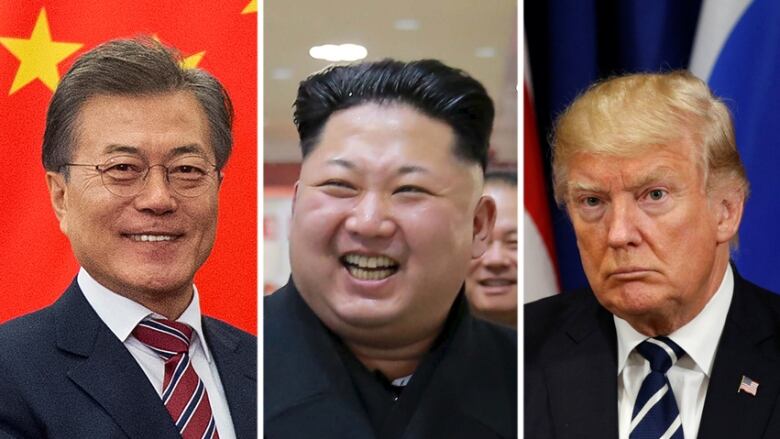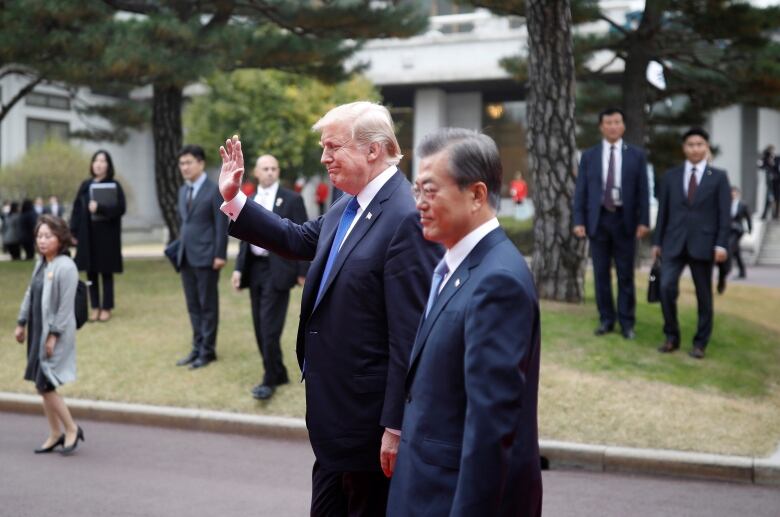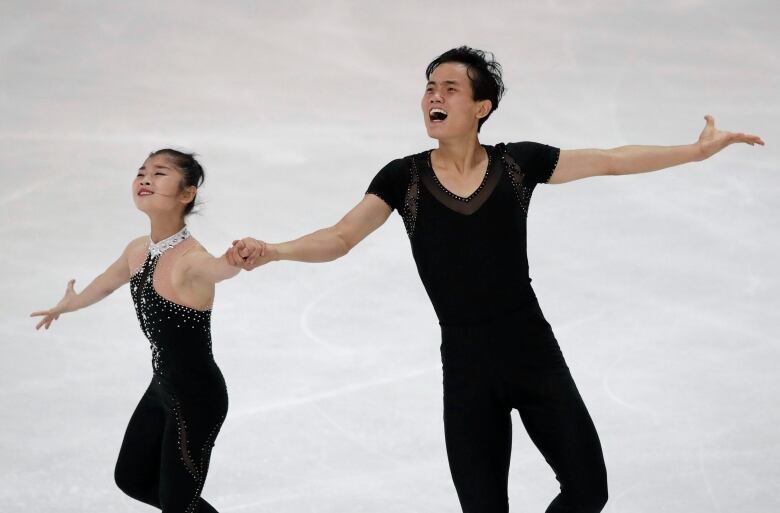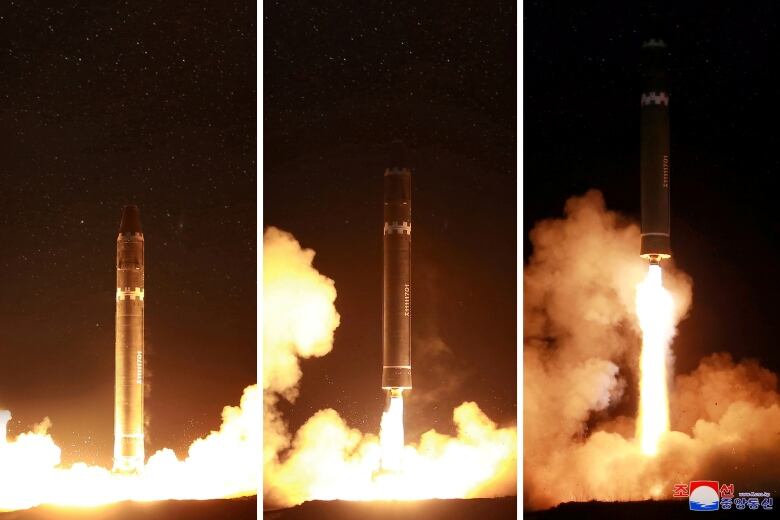As rival Koreas thaw relations before the Winter Olympics, U.S. could get frozen out
Diplomacy could convince world powers 'the problem is the United States,' not North Korea

North Korea analysts are taking a wary view of how rare face-to-face relations between Pyongyang and Seoul could leave the Americans out in the cold.
The rival Koreas are talking. That's ostensibly a good thing. But what the breakthrough could mean for the U.S. is fraught. Beyond the cheery backdrop of upcoming Olympic Winter Games in South Korea, foreign-policy experts warn the renewed inter-Korean diplomacy might well be a ploy.
It's potentially one that would buy time for the hermit kingdom to perfect a new missile capable of striking the U.S. mainland, help North Korea convince its Southern neighbour to oppose U.S.-led sanctions, and isolate the Americans on the world stage.
The tension-cooling statecraft between old foes in the peninsula involves the North agreeing tosend a "high-level delegation" to next month's Olympics in the South, includingathletes, a cheering squad and an art troupe. North Koreahasalso reopened a dormant border hotline with South Korea.

U.S. President Donald Trump and his South Korean counterpart Moon Jae-in, a liberal, have clashed when it comes to dealing with Pyongyang. Trump has dismissed diplomacy; Moon favours it, giving way to a possible rift.
That's where North Korean leader Kim Jong-un could see an opportunity, says American University international relations professor Jordan Tama.
"South Korea is much more united behind the notion of pursuing talks with North Korea than the U.S. is, so there's kind of an open door there, and it's not really clearstillto what extent the Trump administration will support or participate, at least indirectly, in these talks."
Tama believes Kim's outreach now only after months of persistent overtures from Moon might be a complex strategy to drive a wedge betweenthe U.S. and South Korea in their decades-oldalliance.
Lisa Collins, a fellow with the Korea Chair at the Center for Strategic and International Studies, also sees good reason for U.S. skepticism about the inter-Korean military meetings. The U.S. and South Korea have agreed to postpone joint military exercises to later in the spring, and the North might request that the exercises be cancelled altogether.

"Or it might be a tactic to ease up on the pressure of sanctions, which came down harder than [the North] anticipated in the last few months, and that North Korea is basically trying to get temporary relief from that pressure," Collins said.
With China as a possible intended audience, Collins suggested the North's response to the South's calls for a meeting could help it appear more rational than Trump, who has in recent days traded taunts with Kim over whether he commands a scarier nuclear "button."
North Korean Leader Kim Jong Un just stated that the Nuclear Button is on his desk at all times. Will someone from his depleted and food starved regime please inform him that I too have a Nuclear Button, but it is a much bigger & more powerful one than his, and my Button works!
—@realDonaldTrumpAlthough Trump has taken credit for the warming North-South relations, he and his administration have taken a hard line ondiplomacy, with the president saying in October thatSecretary of State Rex Tillerson was "wasting his time" negotiating with the North.
If North Korea's objective is to get China's attention as Beijing upholds United Nations sanctions over Pyongyang's nuclear activities, the North "probably wanted to seem more reasonable than the U.S., in order to convince China that North Korea is not necessarily the problem; the problem is the United States," Collins said.

Harry Kazianis, director of defence studies at the Washington-based Center for the National Interest, isn't buying the North Korean outreach as a benign gesture.
"It's a stalling tactic. A ruse. A trap. It's basically a play for time," Kazianis said.
North Korean leader Kim appears to be taking an opportunity to pocket some concessions from the South through the possible easing of sanctions for its pursuit of nuclear weapons, he said.
"Sanctions are starting to bite. Ninety per cent of their exports are starting to get cut, they're not getting as much refined oil products, and they're hurting."
Kazianis suspects the longer-term play is a delay tactic in service of a goal to refine its intercontinental ballistic missile, or ICBM, a long-range weapon that could threaten a major U.S. city.
"The North is very close to having an ICBM that can hit the U.S. homeland, but they need a few months to get the tech finished; to get the re-entry heat shield finished so that when they fire the warheads, it can re-enter the atmosphere."

In the meantime, Kazianis says, family reunification between citizens of South Korea and North Korea should proceed, and Kim's athletes and diplomats at the Olympics will lend "an air of legitimacy" to a regime that has in recent days exchanged taunts with U.S. President Donald Trump over which nation has a scarier nuclear arsenal.
The Olympic opening ceremonies might look promising or that peace might be at hand.
"You'll have Kim's sister there in the same stadium, potentially with members of the Trump family," Kazianis said, making for "touching" optics as North and South Korea potentially march under a unified flag.
"But really, this is all going to break down in April," he predicted. Kazianis expects the North to resume testing its ICBM in the South Pacific, following delayed U.S.-South Korean joint military exercises.
If that happens, the North may say it's happy to continue talks with the South Koreans.

"And what does the Trump administration do then? Do they put pressure on Seoul to stop those talks, with progress that's being made? Kim is playing a very bad hand very well, and you have to give him some credit there."
Unless provoked, new U.S.-led sanctions would demonstrate a lack of faith in the inter-Korean dialogue process, added Stephen Noerper, senior director for policy at the non-partisan Korea Society, a non-profitpromoting U.S.-Korean co-operation.
The North, he said, "sees a more progressive administration in Seoul, at seeming odds, at times, with a more conservative White House."
The U.S. should allow the engagement to progress without interference, Noerper said.And that could require flexibility from the Trump administration.
"The North Koreans realize that if Trump appears unstable, it makes more South Koreans sit up and become shy of this particular White House," Noerpersaid. "We would only hurt ourselves as the U.S. if we didn't support our allies in this process."













_(720p).jpg)


 OFFICIAL HD MUSIC VIDEO.jpg)
.jpg)



























































































